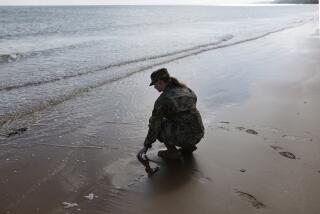Old WWII Films Were No ‘Slap in Face’
- Share via
I am a great admirer of Steven Spielberg, but this sense of self-importance he displays in his defense of “Saving Private Ryan” is a bit much (“Rating the Big One,” Calendar, July 15).
So says the filmmaker:
“You know, in this age of disclosure, it would have been irresponsible for me to undercut the truth of what that war was like. There have been 84 World War II films that showed something else. This would have been the 85th slap in the face to the men who died knowing the truth.”
And further:
” . . . I felt that the truth about what happened on Omaha Beach was long overdue.”
My goodness.
On behalf of the deluded, I do so thank Spielberg for showing us the way of right and self-righteousness. Could he be referring to Sam Fuller’s (who was there) “The Big Red One”? Or Darryl F. Zanuck’s (who was also there) “The Longest Day”?
In the latter film, does he think combat veteran Eddie Albert participated in a fraud on the American people and dishonored his fallen comrades by appearing in what Spielberg apparently believes is a false representation of what happened there on that day in June 1944, slapping them in the face as it were? I don’t think Spielberg really wants to go there.
I’m a veteran of a different time, but I’ve always been an interested student of my comrades of days gone by, and I have never talked to a veteran, read a book, watched a documentary or seen a movie, for that matter, that did not give due note of the mayhem and carnage that occurred on Omaha Beach.
*
There were tanks that some bright engineers thought would float in the current of the English Channel. Well, they leaked, as anyone with an ounce of common sense could have told them, and they sank like stones. There were soldiers inside those tanks, and they drowned. I don’t need some filmmaker’s stylized, make-believe violence to tell me how horrible that death must have been.
I once heard Andy Rooney (who was there) say that the Normandy invasion was the most unselfish act that one nation ever did for another. That’s the point, not dismembered bodies and rotting corpses. Those are the sensational realities, and they are not new. They are pretty much common to all wars, and most people know it.
I don’t know what Spielberg hopes to accomplish with his stylized violence and realistic portrayal of decapitation and death, all professionally done and of the first order, I’m sure.
Spielberg is a professional storyteller, that’s what he does (historian being a relatively new avocation), but what I’m sure this movie will not do is rise to the level of being the ultimate arbiter of the truth about Omaha Beach.
For that, I think, is better left to those who experienced the event. None of the depictions with which I am familiar is disrespectful of those stories that were not and can never be told.
So I will attribute Spielberg’s hubris to the conceit of newfound knowledge and to the arrogance of the recently converted.
I must refer one more time to Fuller, who said that the only way to give an audience a realistic notion of war is to have some guy behind the screen with an M-1 rifle shooting out at them.
Fuller, like Spielberg, will not have the last word on the subject, but it’s got to be the best . . . so far.
*
U.S. Navy veteran David Horton is a copyright researcher for Entertainment Litigation Consultants. He lives in Alhambra.
More to Read
Only good movies
Get the Indie Focus newsletter, Mark Olsen's weekly guide to the world of cinema.
You may occasionally receive promotional content from the Los Angeles Times.







